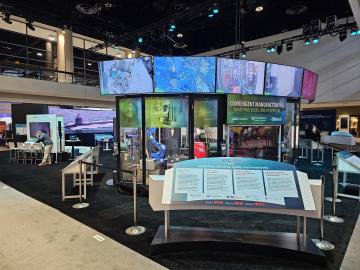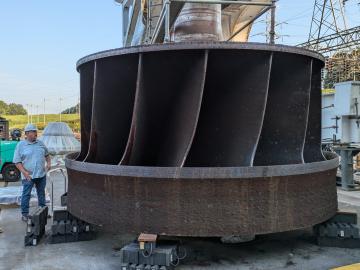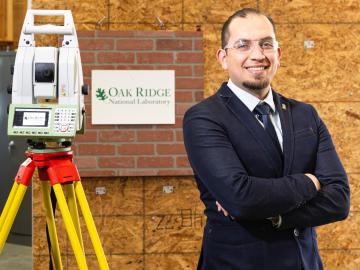
Filter News
Area of Research
News Topics
- (-) 3-D Printing/Advanced Manufacturing (35)
- (-) Artificial Intelligence (46)
- (-) Biomedical (18)
- (-) Cybersecurity (3)
- (-) Nanotechnology (11)
- (-) Transportation (22)
- Advanced Reactors (6)
- Big Data (29)
- Bioenergy (18)
- Biology (23)
- Biotechnology (10)
- Buildings (29)
- Chemical Sciences (30)
- Clean Water (7)
- Composites (14)
- Computer Science (60)
- Critical Materials (8)
- Education (2)
- Emergency (3)
- Energy Storage (17)
- Environment (41)
- Exascale Computing (25)
- Fossil Energy (4)
- Frontier (21)
- Fusion (16)
- Grid (19)
- High-Performance Computing (45)
- Hydropower (1)
- Isotopes (23)
- ITER (2)
- Machine Learning (23)
- Materials (24)
- Materials Science (36)
- Mathematics (7)
- Mercury (1)
- Microelectronics (2)
- Microscopy (9)
- Molten Salt (5)
- National Security (34)
- Neutron Science (33)
- Nuclear Energy (25)
- Partnerships (29)
- Physics (18)
- Polymers (10)
- Quantum Computing (20)
- Quantum Science (25)
- Security (15)
- Simulation (24)
- Space Exploration (5)
- Statistics (3)
- Summit (16)
Media Contacts

Three transportation researchers at the Department of Energy’s Oak Ridge National Laboratory have been elevated to senior member grade of the Institute of Electrical and Electronics Engineers, or IEEE.
After retiring from Y-12, Scott Abston joined the Isotope Science and Engineering Directorate to support isotope production and work with his former manager. He now leads a team maintaining critical equipment for medical and space applications. Abston finds fulfillment in mentoring his team and is pleased with his decision to continue working.

A new convergent manufacturing platform, developed in only five months at the Department of Energy’s Oak Ridge National Laboratory, is debuting at the International Manufacturing Technology Show, or IMTS, in Chicago, Sept. 9–12, 2024.

ORNL has partnered with Western Michigan University to advance intelligent road infrastructure through the development of new chip-enabled raised pavement markers. These innovative markers transmit lane-keeping information to passing vehicles, enhancing safety and enabling smarter driving in all weather conditions.

A team led by scientists at ORNL identified and demonstrated a method to process a plant-based material called nanocellulose that reduced energy needs by a whopping 21%, using simulations on the lab’s supercomputers and follow-on analysis.

ORNL is working with industry partners to develop a technique that combines 3D printing and conventional machining to produce large metal parts for energy applications. The project, known as Rapid Research on Universal Near Net Shape Fabrication Strategies for Expedited Runner Systems, or Rapid RUNNERS, recently received $15 million in funding from DOE.

As a mechanical engineer in building envelope materials research at ORNL, Bryan Maldonado sees opportunities to apply his scientific expertise virtually everywhere he goes, from coast to coast. As an expert in understanding how complex systems operate, he’s using machine learning methods to control the process and ultimately optimize performance.

A research scientist with the Department of Energy’s Oak Ridge National Laboratory, Ayana Ghosh was named the 2024 Early Discovery Award winner by the American Ceramic Society. The award recognizes an early career member of the organization who has contributed to basic science in the field of glass and ceramics.

DOE commissioned a neutron imaging instrument, VENUS, at the Spallation Neutron Source in July. VENUS instrument scientists will use AI to deliver 3D models to researchers in half the time it typically takes.

Jeremiah Sewell leads a team at ORNL, working on xenon-129 production for lung imaging. Reflecting on his career, Sewell views each opportunity as a "door" he steps through, leveraging over 25 years of experience in nuclear power and centrifuge operations to advance the facility’s mission.


